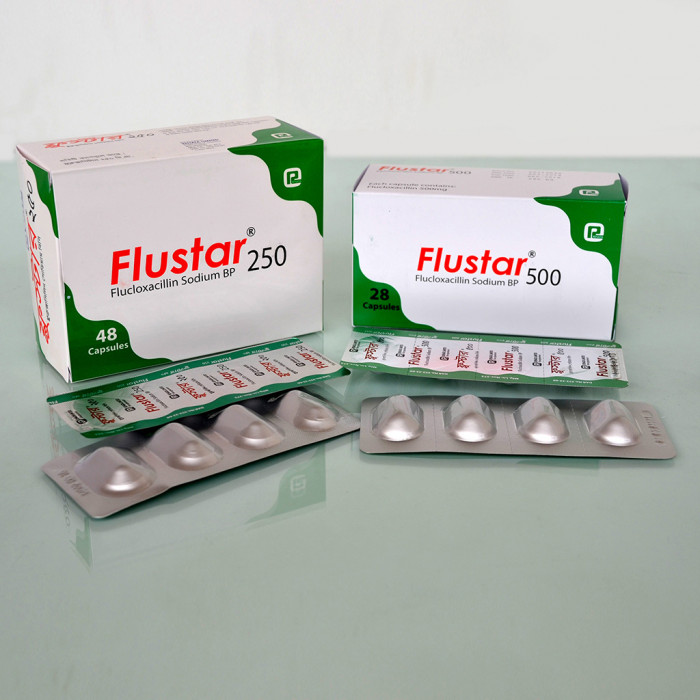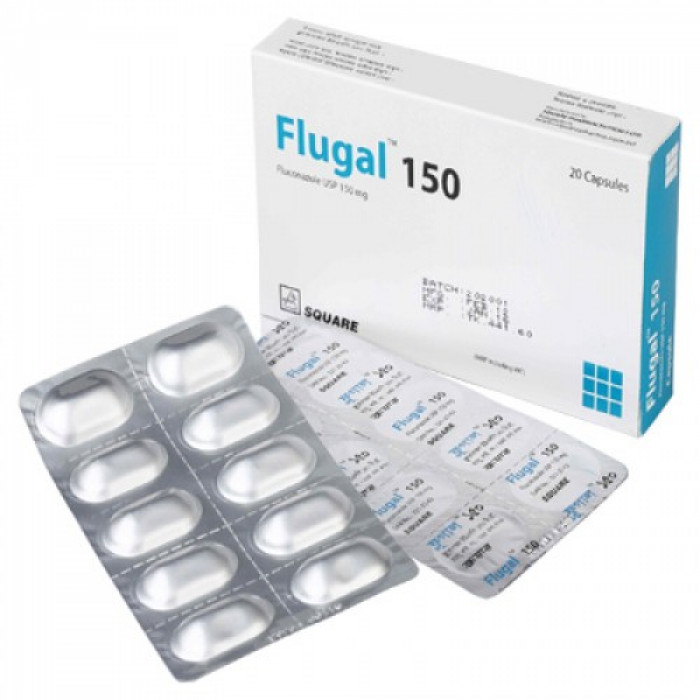
✔ 100% Authentic Product
👁️ Currently Viewing 2836
Flucloxacillin Sodium is used in the treatment of Bacterial Infections.
Discount
Price: ৳ 23
MRP:
৳
24
5%
Off

100% Genuine Products, Guaranteed

Safe & Secure Payments, Always

Fast, Secure & Efficient Delivery

Proper Packaging
 Cash on Delivery - All over Bangladesh
Cash on Delivery - All over Bangladesh Regular Delivery - 12-24 Hours, Dhaka City* Charge Tk.39-59
Regular Delivery - 12-24 Hours, Dhaka City* Charge Tk.39-59 Regular Delivery - 24-48 Hours, Other Cities* Charge Tk.99-110
Regular Delivery - 24-48 Hours, Other Cities* Charge Tk.99-110
🌙 রমযান অফার 🌙
 ফ্রি ডেলিভারিঃ - ৭৯৯ টাকা+ অর্ডারে, ঢাকা
শহরে
ফ্রি ডেলিভারিঃ - ৭৯৯ টাকা+ অর্ডারে, ঢাকা
শহরে ফ্রি ডেলিভারিঃ - ২৭৯৯ টাকা+ অর্ডারে, ঢাকার
বাহিরে
ফ্রি ডেলিভারিঃ - ২৭৯৯ টাকা+ অর্ডারে, ঢাকার
বাহিরে
📲 মোবাইল অ্যাপ অর্ডারে সাশ্রয় বেশী
-
Google Play Store থেকে ডাউনলোড
-
Apple Store থেকে ডাউনলোড
100% Genuine Products, Guaranteed
Safe & Secure Payments, Always
Fast, Secure & Efficient Delivery
Proper Packaging
 Cash on Delivery - All over Bangladesh
Cash on Delivery - All over Bangladesh Regular Delivery - 12-24 Hours, Dhaka City* Charge Tk.39-59
Regular Delivery - 12-24 Hours, Dhaka City* Charge Tk.39-59 Regular Delivery - 24-48 Hours, Other Cities* Charge Tk.99-110
Regular Delivery - 24-48 Hours, Other Cities* Charge Tk.99-110 ফ্রি ডেলিভারিঃ - ৭৯৯ টাকা+ অর্ডারে, ঢাকা
শহরে
ফ্রি ডেলিভারিঃ - ৭৯৯ টাকা+ অর্ডারে, ঢাকা
শহরে ফ্রি ডেলিভারিঃ - ২৭৯৯ টাকা+ অর্ডারে, ঢাকার
বাহিরে
ফ্রি ডেলিভারিঃ - ২৭৯৯ টাকা+ অর্ডারে, ঢাকার
বাহিরে- Google Play Store থেকে ডাউনলোড
- Apple Store থেকে ডাউনলোড
🌙 রমযান অফার 🌙
📲 মোবাইল অ্যাপ অর্ডারে সাশ্রয় বেশী
✅ Description:
Flustar 250mg Capsule is an antibiotic used to treat various bacterial infections. It contains 'Flucloxacillin sodium,' which prevents the formation of bacterial cell walls, leading to the bacteria's death and effective treatment of infections.
Important points to remember when taking Flustar 250mg Capsule:
Follow Prescription: Take the medication as prescribed by your doctor. The duration of treatment will be determined based on your medical condition.
Possible Side Effects: You may experience minor gastrointestinal disturbances like diarrhea, nausea, or vomiting. Most of these side effects usually resolve over time and do not require medical attention. However, if they persist or worsen, consult your doctor.
Allergies and Medical Conditions: Inform your doctor if you have had an allergic reaction to penicillin, flucloxacillin sodium, or any other medicines in the past. Also, disclose any liver or kidney problems, recent vaccinations, pregnancy, or breastfeeding status.
Medication Interactions: Inform your healthcare professional about any other medications, herbal remedies, vitamins, or supplements you are currently taking to avoid potential interactions.
Always adhere to your doctor's advice and complete the prescribed course of Flustar 250mg Capsule 4's to ensure effective treatment and prevent antibiotic resistance. If you have any concerns or questions about the medication, consult your healthcare provider for personalized guidance.
Safety Advices

Alcohol
UNSAFE
Consumption of alcohol with Flustar 250mg Capsule should be avoided.

Pregnancy
Flustar 250mg Capsule should be used with caution if you are pregnant or planning to get pregnant. Consult your doctor before taking Flustar 250mg Capsule.

Breastfeeding
Flustar 250mg Capsule should be used with caution in breastfeeding women. Consult your doctor by taking Flustar 250mg Capsule.

Driving
Flustar 250mg Capsule has no or negligible effect on your ability to drive and use machines.

Kidney
Flustar 250mg Capsule should be used with caution in patients with kidney problems such as severe kidney failure. In such cases, your doctor may adjust the dose to the lowest effective dose. Consult your doctor before taking Flustar 250mg Capsule.

Liver
Flustar 250mg Capsule is not recommended for use in patients with a history of liver diseases such as jaundice after taking the medicine. It should be used with caution in patients with liver problems. Consult your doctor before taking Flustar 250mg Capsule.
✔️ Uses of Flustar 250mg Capsule
- Bacterial Infections
✔️ How does Flustar 250mg Capsule work?
Flucloxacillin (500mg) treats bacterial infections by binding to specific sites in the bacterial cell wall. It inhibits cell wall synthesis, leading to bacterial cell death as enzymes are introduced, causing cell destruction.
✔️ Side Effects of Flustar 250mg Capsule
- Feeling sick or nausea
- Being sick or vomiting
- Diarrhea
- Bloating
- Indigestion
✔️ Quick Suggestions:
- After completing the full course of Flustar 250mg Capsule 4's, take probiotics to restore healthy bacteria in the intestines and reduce the risk of antibiotic-associated diarrhea.
- Incorporate fiber-enriched foods like whole grain bread and brown rice in your diet to stimulate gut bacteria growth.
- Avoid alcoholic beverages as they can lead to dehydration and disrupt sleep, hindering the medication's effectiveness in fighting infections.
- Stay well-hydrated by drinking plenty of water or other fluids while taking Flustar 250mg Capsule.
- If using the medication for an extended period, monitor liver and kidney function regularly. Inform your doctor if undergoing urine or blood tests, as Flustar 250mg Capsule 4's may affect the test results.
✔️ Indication of Flustar 250mg Capsule
- To treat infections of the chest, throat, nose, ear, skin and soft tissue, heart, bone, meninges (membrane covering the brain), digestive system, blood, kidney, bladder, or urethra
- Prevent infections that occur during major surgeries especially heart or orthopedic surgery
✔️ Pharmacology
Effectiveness: Flucloxacillin is primarily effective against Gram-positive bacteria, particularly those that produce penicillinase (an enzyme that degrades penicillin). It has limited activity against Gram-negative bacteria.
Mechanism of Action: Flucloxacillin works by preventing the formation of bacterial cell walls. It is classified as an isoxazolyl penicillin, combining resistance to penicillinase hydrolysis, stability in stomach acid, and potent activity against Gram-positive bacteria.
Bactericidal Action: Flucloxacillin is a bactericidal antibiotic, meaning it kills bacteria rather than just inhibiting their growth.
Targeting Staphylococci: Flucloxacillin is particularly effective against staphylococci that produce penicillinase, making it a valuable option for treating infections caused by these bacteria.
Inhibition of Peptidoglycan Production: Flucloxacillin inhibits the production of peptidoglycan, a vital component of the bacterial cell wall that provides mechanical stability. This inhibition disrupts cell wall formation and leads to bacterial cell death.
Gram-Positive Bacterial Infections: Flucloxacillin is used to treat infections caused by Gram-positive bacteria, but it is not effective against Gram-negative bacteria like E. coli.
Peptidoglycan Cross-Linking: The completion of cross-linking in peptidoglycan production, involving the terminal glycine residue of the pentaglycin bridge, is the final step that flucloxacillin inhibits by targeting the transpeptidase enzyme.
✔️ Dosage & Administration of Flustar 250mg Capsule
Oral Administration:
- Adult: 250 mg four times daily. The dosage may be doubled in severe infections.
- In osteomyelitis and endocarditis, up to 8 gm daily is used in 6-8 hourly divided doses.
Children:
- 2-10 years: Half of the adult dose (125 mg four times daily).
- Under 2 years: A quarter of the adult dose (62.5 mg four times daily).
Parenteral Administration (Intramuscular or Intravenous):
- Adult or Elderly: 250 mg four times daily. All systemic doses may be doubled in severe infections, with doses up to 8 g daily suggested for endocarditis or osteomyelitis.
Children:
- 2-10 years: Half of the adult dose (125 mg four times daily).
- Under 2 years: A quarter of the adult dose (62.5 mg four times daily).
Oral doses should be administered 1 hour before meals.
As always, it is essential to follow the prescribed dosage and administration instructions provided by the healthcare professional. If you have any questions or concerns about the medication's dosage, consult your doctor for clarification and personalized advice.
✔️ Interaction
Drug-Drug Interactions:
- Chemotherapy Drugs (e.g., methotrexate): Flustar 250mg Capsule 4's may interact with chemotherapy drugs. It's important to inform your doctor if you are receiving chemotherapy or any other cancer treatments.
- Medicines Used to Prevent Blood Clotting (e.g., warfarin): Flustar 250mg Capsule 4's may interact with medications used to prevent blood clotting, like warfarin. Such interactions may affect the effectiveness of blood-thinning medications, and your doctor may need to adjust the dosages accordingly.
- Other Antibiotic Medications: Flustar 250mg Capsule 4's may interact with other antibiotic medications. Inform your doctor about all antibiotics you are currently taking to avoid potential interactions.
Drug-Food Interactions: No specific drug-food interactions have been reported with Flustar 250mg Capsule 4's. However, it's always a good idea to follow a balanced diet and avoid excessive consumption of certain foods that may interfere with your medications.
Drug-Disease Interactions:
- Kidney or Liver Problems: If you have kidney or liver problems, it's crucial to inform your doctor before taking Flustar 250mg Capsule 4's. Dosing adjustments may be required to ensure the medication is safe and effective for you.
- Other Major Illness: If you have any other major illnesses, it's essential to disclose them to your doctor. Certain medical conditions may interact with the medication, and your doctor can best assess the suitability of Flustar 250mg Capsule for your specific health condition.
✔️ Contraindications
Flucloxacillin is not recommended for people who are allergic to penicillin.
✔️ Pregnancy & Lactation
Flucloxacillin is classified as a pregnancy category B medication by the US Food and Drug Administration (FDA). Pregnancy category B means that there are no adequate and well-controlled studies in pregnant women, but animal studies have not shown any harmful effects on the fetus.
However, because animal studies cannot always predict human response accurately, the use of flucloxacillin during pregnancy should only be considered if absolutely necessary and under the guidance of a healthcare professional. The potential benefits of the medication must be carefully weighed against the potential risks to the unborn baby.
It's also important to note that flucloxacillin can be detected in human milk when given to breastfeeding women. Therefore, caution should be exercised when using flucloxacillin while breastfeeding. The decision to use the medication during breastfeeding should be made in consultation with a healthcare provider, considering the benefits of treatment for the mother and the potential risks to the nursing infant.
As with any medication during pregnancy and breastfeeding, it is essential to seek guidance from a healthcare professional to ensure the safety and effectiveness of the treatment for both the mother and the baby.
✔️ Precautions & Warnings
Allergic Reactions: If you have a history of allergic reactions to penicillin, flucloxacillin sodium, or any other medicines, make sure to inform your doctor. Allergic reactions can be serious and potentially life-threatening, so it's essential to avoid medications that may trigger such reactions.
Liver or Kidney Problems: If you have liver or kidney problems, your doctor needs to be aware of this before prescribing flucloxacillin sodium. Dosing adjustments may be necessary to ensure the medication is safe and effective for you.
Vaccinations: Inform your doctor if you have recently had or are planning to have any vaccinations. Some vaccines may interact with certain medications, and your doctor can advise you on the appropriate timing.
Pregnancy and Breastfeeding: If you are pregnant or breastfeeding, it's essential to consult your doctor before taking any medication, including flucloxacillin sodium. As previously mentioned, the use of this medication during pregnancy and breastfeeding should be carefully considered and decided in consultation with a healthcare provider.
Other Medications: Be sure to disclose all other medications you are taking, including herbal remedies, vitamins, and supplements. Drug interactions can occur, affecting the effectiveness and safety of medications, so your doctor needs to be aware of your complete medication regimen.
✔️ Storage Conditions
Keep away from light and heat in a dry area. Keep out of children's reach.
⚠️Disclaimer:
At ePharma, we’re committed to providing accurate and accessible health information. However, all content is intended for informational purposes only and should not replace medical advice from a qualified physician. Please consult your healthcare provider for personalized guidance. We aim to support, not substitute, the doctor-patient relationship.





















